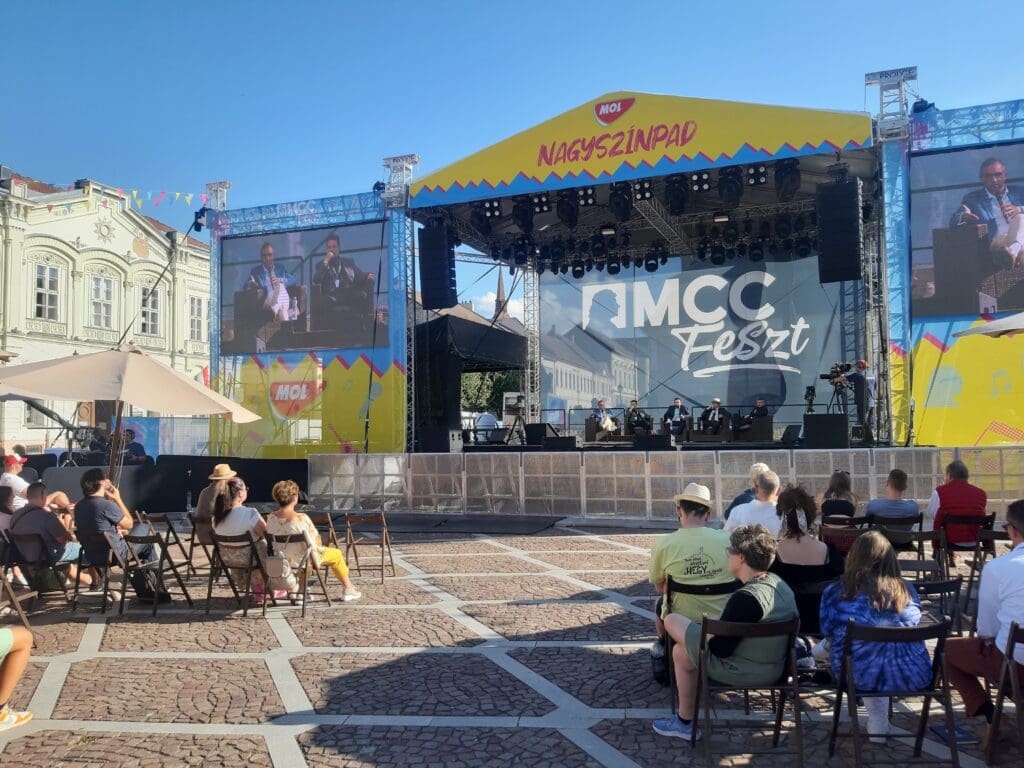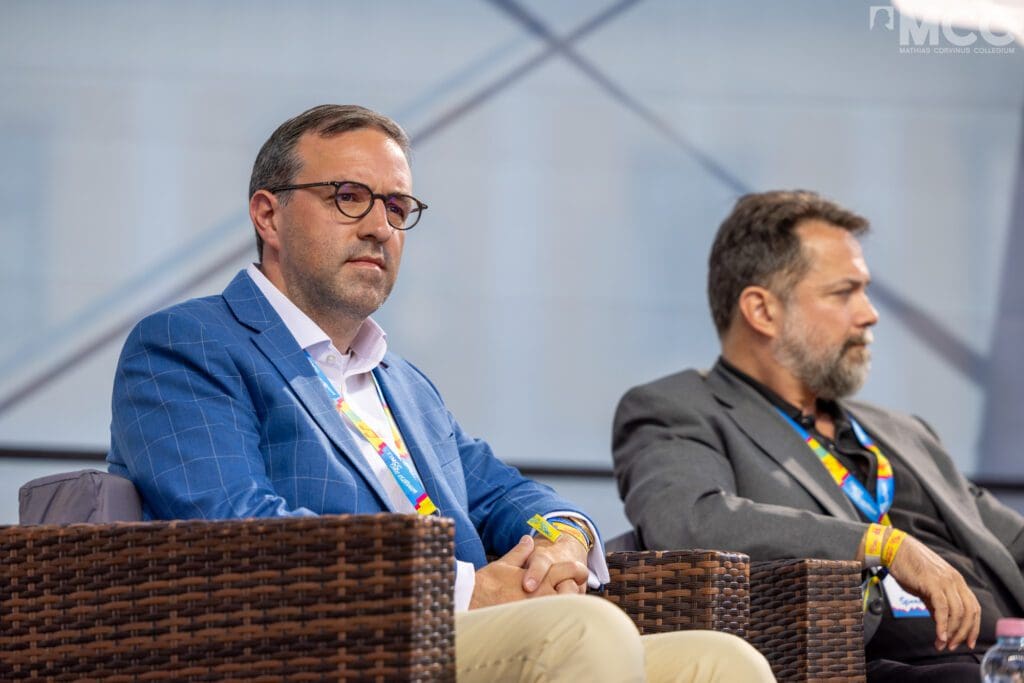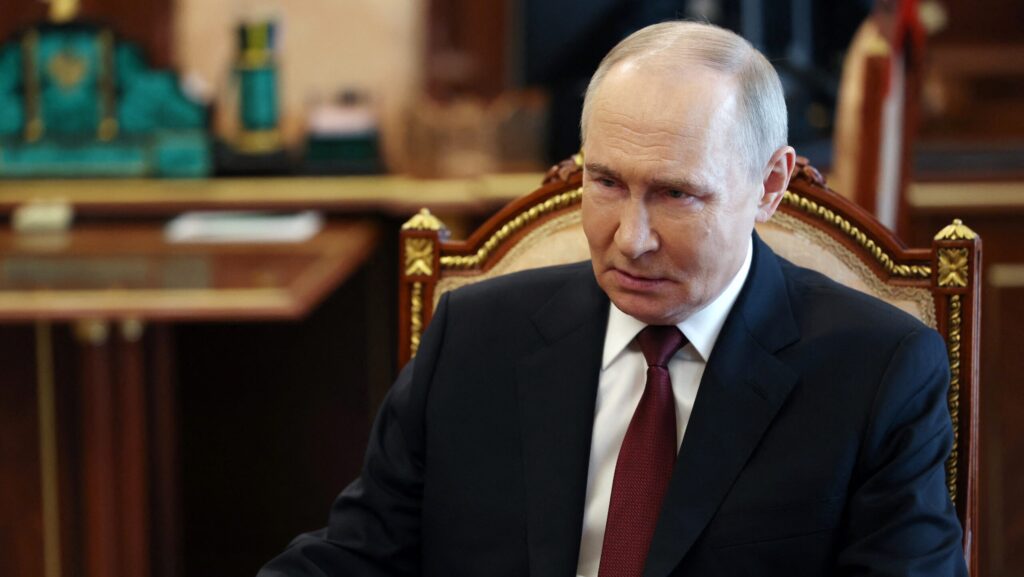MCC Feszt, a grandiose event organised by the Mathias Corvinus Collegium, has just commenced its third instalment, back in their usual host town of Esztergom. As MCC Director General Zoltán Szalai pointed out in his opening speech, attendance has stayed on an upward trajectory in these three years. While only 2,000–3,000 people were expected to turn up at the inaugural event in 2021, actually 13,000 did. 30,000 people attended last year’s festival, while this year,
the organisers are counting on 40,000 attendees in their estimation.
MCC Feszt 2023 features some of Hungary’s biggest musical acts, such as the Bagossy Brothers Company, Follow the Flow, T. Danny, and Ákos; as well as illustrious, highly influential people from the world of politics as speakers or panellists, such as American political commentator Michael Knowles and Former Chancellor Sebastian Kurz of Austria.
Looking at the audience of the opening remarks and the opening panel on the main stage at Széchenyi Square, there was a wide range of age groups represented, from early 20s to retirement age. A young couple has told us that they came to Esztergom specifically to take part in MCC Feszt; while another young man claimed that he is mainly here for the speakers and panels, but might be persuaded to go to one of the concerts, ‘depending on how the night goes’.
Esztergom Mayor Ádám Hernádi was the first to greet the crowd with short opening remarks. He told the audience that ‘Esztergom and MCC Feszt have grown into one’, and that he hopes this will be a festival of ‘incessant partying and meaningful discussions’. Fidesz MP Gábor Erős, who currently represents Esztergom’s district in parliament, claimed that MCC Feszt has become one of the biggest festivals in the country, and that he believes
it will the talked about not just in Hungary, but in Europe as well.
Director Szalai, apart from sharing the impressive attendance numbers, highlighted the official slogan of the event, which is ‘We give voice to the talented’.

Gladden J. Pappin, Benjamin Friedman Discuss Geopolitics at MCC Feszt 2023
The very first panel of MCC Feszt featured a discussion with Gladden J. Pappin, PhD, the president of the Hungarian Institute of International Affairs, Dean Karalekas, PhD, a research fellow at the Centre of Austronesian Studies at the University of Central Lancashire, Benjamin Friedman, policy director at Defense Priorities, and Michael Hume, a writer for the Daily Mail, The Sun, and The European Conservative. The panel was titled ‘Geopolitical Realities in a Changing World’, and the main topic, evidently, was the ongoing Russo-Ukrainian war.
Mr Pappin said while many predicted this war would end the unipolar era of geopolitics that was the status quo since the end of the Cold War, this may only be partially true. That is because the United States is still the one who determined the West’s war policy in Ukraine, and remains by far the biggest supplier of military equipment and aid. However, the USG lacks vision and leadership, and has no clear plan to achieve peace in Eastern Europe.
‘Yes, people talk about the US now dominating European policy more than it ever has before, but to what end? Where is it going, what is the point of the leadership? That’s what has become unclear, and I think a lot of other countries are looking at it the same way,’ he opined.
Mr Karalekas believes that the Ukraine conflict is just part of what Former US Representative Tulsi Gabbard calls ‘the forever war’, but without the drawback of having to sacrifice the lives of American soldiers. He added that
while the US is fighting a proxy war in Ukraine, Russia is not.
Going back to the question of a shift in geopolitical eras, Mr Karalekas believes it would take decades to find out if that is the case now; while Mr Friedman is of the opinion that this is certainly not the end of the unipolar period. While European countries did increase their defence budgets and made commitments to be more in charge of their own defence after the Russian invasion, the US ended up stepping up and being the primary player in the West’s response to the war, both economically and politically, after all. While many expected Russia to take a quick victory in Ukraine, they ended up failing to do so, largely thanks to the US’s counterefforts.

Mr Hume, on the other hand, thinks that
the Russo-Ukrainian war was when ‘geopolitics collided with reality’.
Many in the West held the firm belief that ‘history had ended’, that no more major conflicts would be coming, and that no major geopolitical shifts could take place in today’s globalised world, where borders and national sovereignty do not even really matter.
Russia’s invasion of its neighbour has proven that wrong. Also, as Mr Hume pointed out, China and India abstained from the vote on the condemnation of Vladimir Putin’s aggression in the United Nations, which constitutes about 3 billion people in their combined populations.
This takes us to another topic of the panel discussion, the role of China on the world stage. Mr Karalekas told the audience that, unlike Western countries, China still has ‘civilisational confidence’, and that they believe in a circular view of history, unlike the West’s linear view. Mr Friedman, however, believes that their rapidly increasing GDP is more important than their ‘civilisational confidence’; and that he is not sure how focused China’s current leadership is on taking the prime international role in geopolitics. As he put it, ‘Taiwan is 90 per cent of China’s problem today’. However, he also believes that the way Russia’s war in Ukraine worked out, it is less likely that Beijing would take military action against Taipei.
The last theme left to be discussed in the afternoon was the upcoming US presidential election in 2024. The panellists appeared to be in agreement that President Joe Biden is in a good position for reelection. As Mr Pappin put it, while the President seems weak, his administration seems strong. Meanwhile, Mr Friedman thinks that major change in US foreign policy is very unlikely even if Donald Trump were to get back in the White House, as it has stayed fairly consistent for decades, under multiple presidents of both major parties (including Trump).
Mr Hume, however, did direct some criticism toward President Biden and his administration, calling their foreign policy ‘childish’, pointing to the example of a billboard campaign in Hungary sponsored by the local US Embassy, adding that the Biden administration ‘wants to dress the world in rainbow colours’, in reference to their pushing the LGBTQ agenda worldwide.
Related articles:








